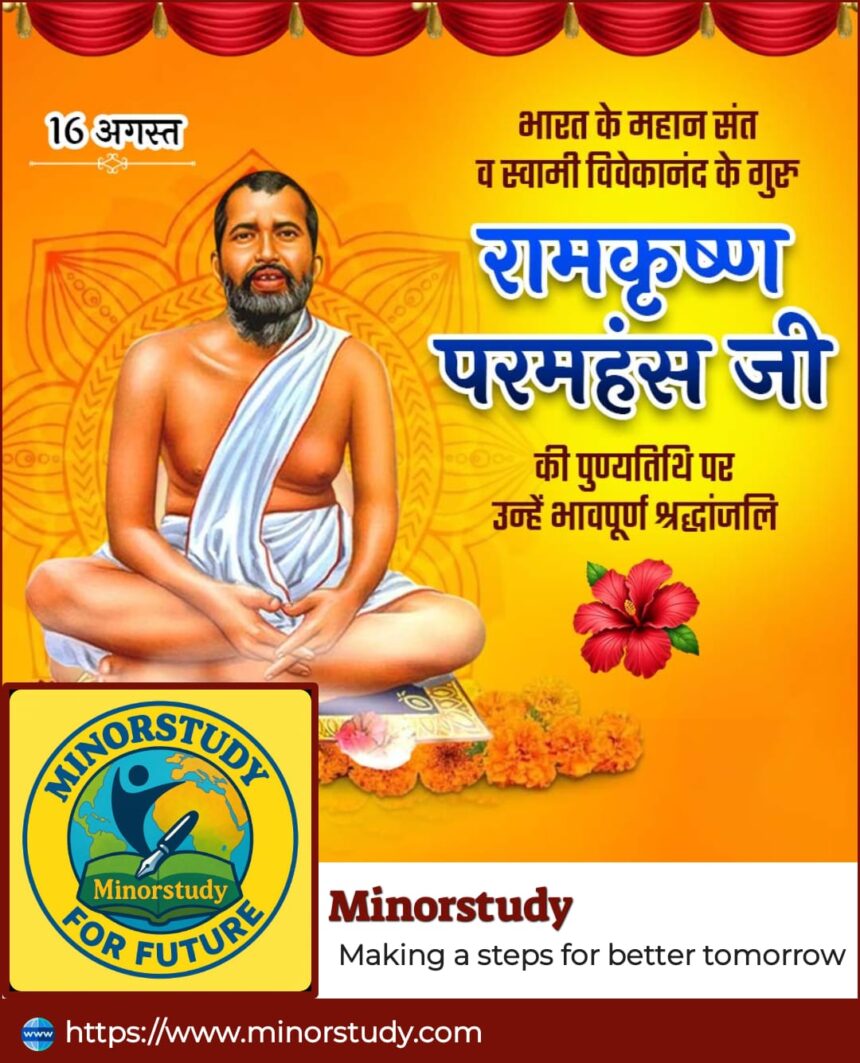Ramakrishna Paramahansa Ji – Life, History, and Spiritual Legacy
Ramakrishna Paramahansa Ji, one of India’s most revered spiritual leaders, was a beacon of divine wisdom, devotion, and universal love. Born in the 19th century, he inspired countless individuals through his teachings, spiritual practices, and personal example of intense devotion to God. Known for his emphasis on experiential realization of divinity, Ramakrishna Ji’s life continues to guide seekers on the path of spiritual enlightenment.
This guide explores his history, facts, FAQs, timeline, significance, daily life impact, and societal contributions in a human-friendly, relatable manner.
Early Life and History
Birth and Family:
Ramakrishna Paramahansa Ji was born as Gadadhar Chattopadhyay on 18 February 1836 in Kamarpukur, West Bengal. His parents, Khudiram Chattopadhyay and Chandramani Devi, raised him in a devout and simple household. From an early age, he displayed an extraordinary spiritual inclination, often meditating and experiencing divine visions.
Childhood Spirituality:
Even as a young boy, Ramakrishna Ji exhibited a deep devotional love for Goddess Kali. He often practiced intense austerities, meditated, and sought God through various spiritual disciplines, demonstrating early signs of a profound mystical personality.
Facts About Ramakrishna Paramahansa Ji
Universal Spiritual Vision: He taught that all religions lead to the same ultimate reality.
Devotion to God: His life was centered on intense love and surrender to the divine, particularly in the form of Kali.
Spiritual Practices: Practiced tantric, vedantic, and bhakti yoga under guidance to experience God directly.
Influence on Society: Inspired disciples such as Swami Vivekananda to propagate spiritual and social upliftment.
Miraculous Experiences: His mystical experiences included visions, divine ecstasies, and profound spiritual realizations, which became lessons in devotion and renunciation.
Timeline of Ramakrishna Ji’s Life
1836: Born in Kamarpukur, West Bengal.
1850s: Began early devotional practices and meditations.
1855–1860: Served as a priest at Dakshineswar Kali Temple, deepening spiritual practice.
1860s: Experienced intense divine visions, realized the unity of all religions.
1886: Passed away on 16 August 1886, leaving behind a legacy of spiritual wisdom.
Posthumous Influence: His teachings spread worldwide through disciples, especially Swami Vivekananda, inspiring the Ramakrishna Mission and global spiritual movements.
Significance of Ramakrishna Paramahansa Ji
Spiritual Universality: He emphasized that different paths lead to the same truth, fostering religious harmony.
Devotion and Practice: Demonstrated that intense love and disciplined practice are keys to spiritual realization.
Human Values: Advocated compassion, humility, and service to humanity as central spiritual principles.
Inspiration for Leaders: Mentored Swami Vivekananda, who propagated India’s spiritual wisdom globally.
Societal Impact: Through his teachings, he encouraged ethical living, social harmony, and inner awakening.
Teachings of Ramakrishna Paramahansa Ji
Unity of Religions: God can be reached through various spiritual paths – Hinduism, Islam, Christianity, and others.
Selfless Devotion: Surrender and love for God cultivate inner peace and joy.
Experiential Knowledge: Spiritual truth must be directly experienced, not just intellectually understood.
Service to Humanity: Serving others is equivalent to serving God.
Detachment: Renunciation of material attachments leads to inner freedom and bliss.
Spiritual Guidance: Seek the guidance of a realized teacher to progress in spiritual life.
Balance of Life: Integrate spirituality with daily responsibilities, living harmoniously with society.
FAQs About Ramakrishna Paramahansa Ji
Q1: What is the main message of Ramakrishna Ji’s teachings?
A1: All religions are valid paths to the same divine reality, and love, devotion, and direct experience of God are essential.
Q2: How did he influence Swami Vivekananda?
A2: Ramakrishna Ji’s guidance, teachings, and personal example shaped Vivekananda’s philosophy of spiritual service and global awareness.
Q3: Can non-Hindus benefit from his teachings?
A3: Absolutely. His universal principles of love, compassion, devotion, and ethical living are applicable to all spiritual seekers.
Q4: How are his teachings applied in daily life?
A4: Through meditation, ethical conduct, devotion, and service, one can integrate his wisdom into modern living.
Daily Life Impact
Inner Peace: Encourages meditation and prayer for mental clarity and calmness.
Ethical Living: Promotes honesty, compassion, and responsibility in daily actions.
Stress Management: Spiritual practices reduce anxiety, anger, and mental tension.
Community Service: Inspires acts of kindness, volunteerism, and social responsibility.
Balanced Lifestyle: Harmonizes spiritual growth with family, work, and societal duties.
Societal Importance
Ramakrishna Ji’s teachings continue to impact society profoundly:
Education and Service: Through the Ramakrishna Mission, schools, hospitals, and charitable institutions serve millions.
Interfaith Harmony: His message encourages respect and understanding between diverse religions.
Global Spiritual Influence: Inspired worldwide spiritual seekers and leaders, promoting peace, compassion, and self-realization.
Cultural Preservation: His life and teachings preserve and propagate India’s spiritual and philosophical heritage.
Conclusion
Ramakrishna Paramahansa Ji’s life is a shining example of devotion, wisdom, and universal love. His teachings emphasize experiential realization, ethical living, and service to humanity, offering practical guidance for modern life. By integrating his principles, individuals can experience inner peace, spiritual growth, and harmony in society.
Remembering Ramakrishna Ji is a reminder that true spiritual enlightenment combines devotion, practice, and compassion, making his legacy eternally relevant. His wisdom inspires people to seek God within, respect diverse paths, and serve humanity selflessly, transforming lives and communities in profound ways.








